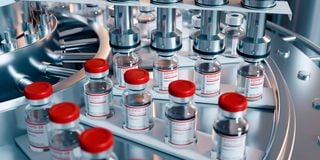How State is using tax policy to turn Kenya into medicines hub

Covid-19 mRNA vaccine production platform. Moderna is expected to open an mRNA facility in Kenya to produce up to 500 million doses of vaccines every year.
What you need to know:
- Among others, the government waived withholding tax on royalties and interest paid to a foreign person by a company undertaking the manufacture of human vaccines here.
- Moderna is expected to open an mRNA facility in Kenya to produce up to 500 million doses of vaccines every year.
A few lucky businesses were fortunate enough to benefit from the sweeping tax changes contained in the Finance Act 2023. But it has been all smiles for those in the pharmaceutical sector.
The administration of President William Ruto, just like that of his predecessor, wants to position Kenya as the regional drug-making hub.
This explains several tax incentives contained in the controversial Finance Act, which has rattled Kenyans.
In what is aimed at attracting foreign direct investment (FDI) into the pharmaceutical sector, especially for multinationals that manufacture vaccines, the government waived withholding tax on royalties and interest paid to a foreign person by a company undertaking the manufacture of human vaccines in Kenya.
That is sweet music to foreign companies such as the US-based Moderna Inc, a biotechnology company that develops various vaccines. Months before the Finance Act was passed by MPs, Moderna announced that it had finalised an agreement to establish an mRNA manufacturing facility in Kenya.
The mRNA—or messenger RNA—is a molecule that contains instructions or recipe that directs the cells to make a protein using its natural machinery. This biotechnology was instrumental in developing the vaccine for Covid-19
Moderna is expected to open an mRNA facility in Kenya to produce up to 500 million doses of vaccines every year.
Moderna will operate under a Special Economic Zone (SEZ) status, signifying Kenya's increasing focus on the SEZ programme as a key enabler of economic growth. SEZ is another area that has benefited a lot from tax incentives.
"We are excited about this milestone that brings to bear our efforts as government to sustain our economic model of facilitating investments that serve not only Kenya but the African continent. My government commits to supporting this investment as a critical signal to the investment community that Kenya is open for business," said President William Ruto in March last year.
Kenya has been a major exporter of pharmaceuticals into the region. Sales last amounted to Sh92.9 billion, an increase of 53.8 per cent from Sh60.4 billion in 2016, official data shows.
Almost a third of the packaged medicines that Kenya export is to Tanzania, followed by Uganda (19.2 per cent), Somalia (9.41 per cent), Rwanda (6.27 per cent), Ethiopia (5.6 per cent) and Zambia (5.24 per cent).
“Kenya presents a big market opportunity for locally manufactured pharmaceutical products. The country’s trade treaties allow manufacturers to access other countries in the region,” said the International Finance Corporation (IFC), the private wing of the World Bank Group, in a 2022 report.
“However, to drive and sustain the growth of the local pharmaceutical industry, these markets will need to be further developed,” added the IFC.
The Finance Act also reduced corporate tax to companies undertaking the manufacture of vaccines to 10 per cent from the standard 37.5 per cent for foreign entities.
Local purchases of plant and machinery by manufacturers of pharmaceutical products or investors in the manufacture of pharmaceutical products were also exempted from the 16 per cent value added tax (VAT) upon recommendation of the Cabinet Secretary for Health.
Another vaccine manufacturer, Astrazeneca, an Anglo-Swedish multinational pharmaceutical and biotechnology company, also partnered with Ministry of Health and Amref, an NGO, to unveil solar powered mobile clinics to help bridge the vaccine gap by providing vaccine education, screening, safe and accessible vaccination, and post-immunisation care in the far-flung area.
These incentives also attracted local players with an eye for the larger regional market. According to the EAC Regional Pharmaceutical Plan of Action 2017–2027, Kenyan manufacturers currently hold 30 per cent of the $1 billion (Sh154 billion) Kenyan pharmaceutical market.
There is, therefore, an opportunity for investors to cater to the remaining 70 per cent, said the International Finance Corporation (IFC), a private investment wing for the World Bank Group.
Questa Care, the manufacturing arm of Surgilinks Ltd, recently opened a $10 million (Sh1.54 billion) pharmaceutical manufacturing factory, in Nairobi.
The factory will be engaged in the production and distribution of Antiretroviral (ARVs) drugs for HIV/Aids, de-addiction therapies and drugs for infectious diseases as well as other general category products.
“These are more than just drugs; they are lifelines for those grappling with those conditions. By producing these medicines locally, we aim to support and ensure a more stable and reliable supply,” said Quest Care’s chairman Deepak Kothari.
But it has not been a smooth-sail for everyone. The new developments in the sector come at a time when pharmaceutical giant GlaxoSmithKline (GSK) was closing down its manufacturing plant while adopting a distributor-led model to supply the country with its products which include mainly prescription drugs and vaccines.
Some of the challenges of pharmaceuticals manufacturing in the country include unavailability of technical skills, high cost of utilities, uncertainty and unpredictable tax measures, said Kothari.
Other challenges include foreign exchange fluctuations resulting in unfair competition and substandard products.
At Quest Care’s inauguration ceremony, Deputy President Rigathi Gachagua ordered an intensified crackdown on the manufacture and sale of counterfeit pharmaceuticals in the country.
“We are witnessing the alarming presence of counterfeit drugs and illicit substances, which are being sold openly in pharmacies. This is a criminal offense, and we must address it urgently,” said Gachagua.
Official data shows that there were 5,893 wage employees engaged in the manufacture of pharmaceuticals, medicinal chemical and botanical products.





